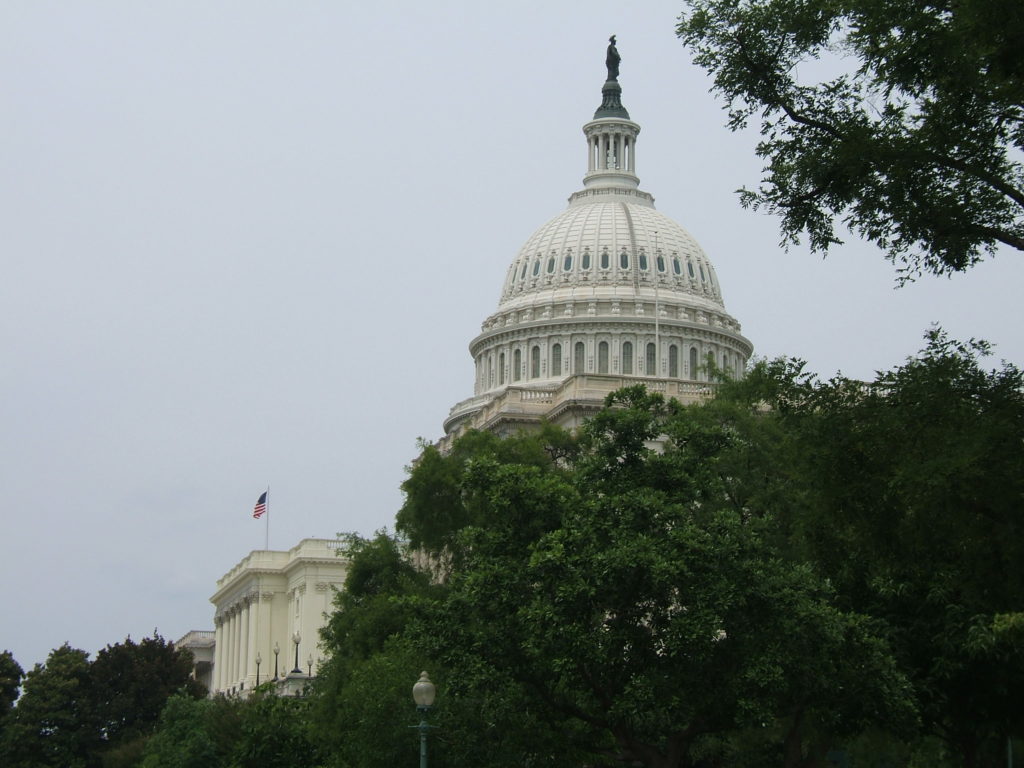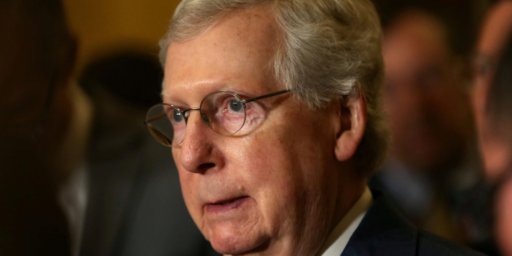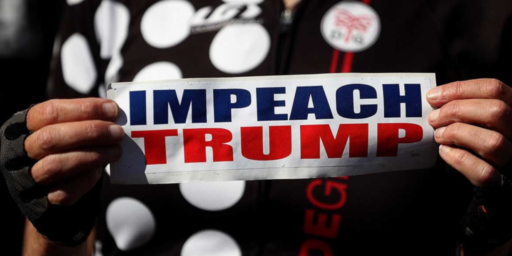On Impartiality in the Senate Trial
Let's be clear-eyed about this.

As Doug Mataconis noted recently, Senators will, based on the 1868 version of the Rules of Impeachment (and last amended in 1986), swear the following oath when they sit as jurors in the impeachment trial of Donald J. Trump:
I solemnly swear (or affirm, as the case may be,) that in all things appertaining to the trial of the impeachment of ______, now pending, I will do impartial justice according to the Constitution and laws: so help me God.
Doug noted in his post that Majority Leader McConnell has said “I’m not an impartial juror. This is a political process.” Indeed, he stated “Everything I do during this, I’m coordinating with the White House counsel.”
To add to that, Senator Lindsey Graham, Chairman of the Senate Judiciary Committee, has stated “I am trying to give a pretty clear signal I have made up my mind. I’m not trying to pretend to be a fair juror here.”
It is, therefore, quite clear that these Senators are not going to take the black letter of the oath seriously.
This has, not surprisingly, sparked outrage among many who find Trump’s actions grounds for removal, and further underscores in the eyes of many that Republicans are not taking the process seriously. Further, the fact that we keep analogizing this process to a legal trials leads many to expect the Senators to actually behave like jurors.
The problem is, as much as I might like to have Senators attempt to put on an impartial mindset, my brain won’t allow me to get upset about the fact that elected, partisan actors are going to act like elected, partisan actors (to get all political sciencey for a second, partisans gonna partisan). Further, from a fully empirical point of view, I know that even if they all pretend like they are going to be impartial, they simply aren’t going to be.
I prefer the honesty to faux impartiality and McConnell is not wrong, this is a political process.
I think honesty is especially important with how this is discussed by the media. The wording of the oath should be serve to short circuit reality, meaning that the press should not cover the process as thought it will be impartial, when it decidedly will not be. A clear-eyed approach to this is essential for true understanding to take place.
Indeed, the behavior on display by McConnell, et al., is fully in keeping with previous posts I have written about the role parties play in bridging separated branches and changing the dynamic of textbook checks and balances. McConnell is far more incentivized to protect the leader of his party than he is to protect the independence of the chamber he leads.
As such, if this all was really an actual jury trial, none of the Senators would be qualified to sit, as they all have some level of stated position on the defendant. So that analogy has substantial problems.
This is not to say that a partisan actor cannot take an oath to have an open mind to hear all the evidence or something to that effect, but impartiality is certainly a bridge too far if the word has any meaning.
So, really, if the Senate really wanted to be honest, it would alter the oath in some way, because there is no way that any of the Senators who take it can really mean it.
There does have to be some kind of oath, as the Constitution requires it in Article II, Section 3 (but the wording and nature of the oath is not specified).
At a bare minimum we should not be surprised (less offended) when elected partisans behave as such.






I think this sort of misses the point.
Nobody expected that McConnell was going to be truly impartial. That was obviously a given.
But McConnell was clearly signalling that no evidence whatsoever was going to sway him.
And that, of course, is a problem – even in the context of what is explicitly a political process.
Is there any way of changing this dynamic? I don’t see how we can keep a republic if our important officials care about party above the res publica.
Forget impartiality. Moscow Mitch et al. are saying they don’t care what the evidence shows, or how terrible, outrageous, deplorable, damaging, contemptible, or criminal Trump’s actions are, they’ll vote to acquit.
There’s not a pretense at objectivity (which IMO trumps impartiality every time), nor of doing what’s best for the country. Instead we get tribalism.
So when a Democratic president does something like this (and Clinton didn’t get even close), they can howl for impeachment and removal, and demand the miscreant be locked up for life or even executed.
@Slugger:
Two words —- divided government.
Recent history has suggested that the Federal Government functions best when Congress and the White House are in the hands of different political parties. We saw that during the Reagan Administration, during Bush 41’s Administration, and (other than the government shutdown battle of 1995-96) during the Clinton Administration.
Impartial doesn’t mean ignorant, it means being fair. The Senate hasn’t been sequestered. I hope all the senators do impartial justice.
@Kathy:
Do you honestly think that the Democratic Senators are impartial in all of this? Several of them have already seemed to make it clear where they stand.
@drj:
Which is pretty much the definition of partisanship in a highly polarized context.
@Doug Mataconis: You can’t use the Reagan era as an example–the structure of the party system was different.
@Steven L. Taylor: Hit “post” too fast: ditto Bush 41.
The shutdown under Clinton is actually the beginning of the current polarized era (post-1994 election). Gingrich is a key contributor to this present moment.
@95 South:
Well, it literally means “not partial or biased” which is no way describes a single member of the Senate.
@Steven L. Taylor:
I disagree. I don’t believe that partisanship and an adherence to the truth are necessarily mutually exclusive.
As you wrote yourself:
@drj: I think what I wrote is not the same thing as impartiality.
I would write the oath to say something along the lines of “faithfully executed their responsibilities” or something along those lines
Fundamentally, all empirical evidence suggests that partisan actors behave in a partisan manner. To expect otherwise is to expect the highly improbable.
I think that part of what has gotten us into the current political predicament is that we are not fully understand how our institutions work (indeed, are often in denial about it).
@Steven L. Taylor:
Fair point but even under President Obama, one can argue that the Federal Government functioned better than it generally has during the two periods in the last ten years when the White House, Senate, and House were controlled by the same party.
@Steven L. Taylor:
As I have said before, one can trace the evolution of the modern GOP into what it has become today from the early 90s under Gingrich to today. Other factors that came into being at the time include the rise of talk radio, online conservative media, and, of course, Fox News.
Another factor that many have pointed to is the end of the Cold War which had a far more significant impact on what had been the coalition that made up the GOP after World War 2 than has geneally been acknowledged.
@Doug Mataconis:
No. But they’re not going to vote to remove Trump because he is a Republican. they’ll vote to remove because he committed the crimes he’s been charged with.
I’d like to think if a Democratic president did the same thing, or other crimes at that level, that many Democrats in the Senate would vote to remove as well. I admit I have no proof.
I thought the impeachment of Clinton was ridiculous partisan overreach. That said, there was at least a semblance of a case for removing Clinton, and there are many legal scholars whom I respect who held this opinion. That to me is the essence of impeachment being a partisan process: members of Congress are influenced by partisan incentives, but it’s still over a matter on which reasonable people can in principle disagree.
That is not the case here. It is absolutely self-evident to anyone with a modicum of sense that Trump has committed massive abuses of power and deserves to be removed, exactly the kinds of “high crimes and misdemeanors” that the Founders had in mind. A serious case against Trump’s removal is simply nonexistent. The Republicans in Congress aren’t bothering to make even the pretense of such a case: most of them are just engaging in the “Chewbacca Defense,” spouting incoherent gibberish in a sustained attempt to distract and confuse. McConnell isn’t being open about normal partisan incentives, he knows just as well as you and I that Trump is guilty is hell, he just doesn’t care and is willing to do literally anything he thinks he can get away with if it will help him further his power.
@Steven L. Taylor:
Sure. As I said before, nobody expects impartiality from partisan actors.
But that doesn’t mean that partisanship must necessarily eclipse adherence to truth, country, or a set of more general moral standards.
If it does, that is a choice, not some inevitable consequence of being a partisan.
It is not unreasonable to expect that political partisans should be able, as well as willing, to faithfully perform their Constitutional duties.
McConnell doesn’t want to. That’s his choice (rather than a systemic consequence); and he should be rightfully pilloried for it.
@Kathy:
I don’t disagree that Trump deserves to be removed from office.
I do disagree with the notion that partisanship is only a one-way street here and that the Democrats are acting based purely on high-minded motives about protecting the Constitution here. Quite frankly, if the President were a Democrat I am certain that at least some of them would be acting in a manner similar to McConnell, Graham, and the others,
Bill Kristol and Jeffrey Tulis have an interesting post on just this subject in the Bulwark this morning.
America’s Mitch McConnell Problem
Treating the impeachment process in the manner that McConnell is, essentially denies the execution of the constitutional process that the founders intended.
Uh huh…impartial also doesn’t mean senators saying things like, “Everything I do during this, I’m coordinating with the White House counsel.” or “I am trying to give a pretty clear signal I have made up my mind. I’m not trying to pretend to be a fair juror here.” The fix is in and everybody knows it…claiming anything else is bullshit…
Perhaps not, but there is no way that anyone can claim that Trump didn’t commit impeachable offenses without denying reality…
So the Federal Government didn’t function better when Obama was president AND the Dems controlled both the House and Senate? I’d love to know how that was worse than when McConnell was in charge of the Senate…
@Sleeping Dog:
And this is where I point out that the founders did not anticipate/understand parties.
(Tulis was a prof of mine in grad school. I will give the piece a look).
Why can’t I be offended just because I’m unsurprised? I think that taking offense at such behavior / declarations shouldn’t even require, as a prerequisite, one to be in the “he’s guilty” camp.
The constitution forbids bills of attainder. Too bad it doesn’t also forbid arbitrary bills of acquittal.
Corruption to my right, tribalism to my left. Stuck in the middle with you, I suppose.
@Steven L. Taylor:
Understand that the founders didn’t anticipate parties. But with all the braying that emanates from the right and among Repugs about Originalism and Founders Intent, you could hope that they might approach impeachment with that frame.
All things considered the Founders were amazingly prescient, it is surprising that they didn’t consider the development of political parties. After all factionalism existed at that time and it wasn’t limited to differences among the state delegations.
Looking into why the founders lack of foresight could be a good subject for a PhD dissertation.
@Sleeping Dog: I am just focusing here on how things work as opposed to how we might like them to work.
It’s always seemed odd Madison and the boys seem so oblivious to parties. In the UK Whigs and Tories go back to like 1680, so parties weren’t a new idea. The Federalists formed loosely almost from day one and the Democratic Republicans split off within a couple years, so the idea of party had to be around. I’m not terribly familiar with the Federalist Papers. Is there some reference to parties there or elsewhere?
@Sleeping Dog:
Not an expert, but…. A democratic republic was basically a brand-new form of government, and they didn’t have anything to compare it against. Today, we take for granted that all democracies have parties. All they had was the history of parties in Great Britain, which they viewed as yet another negative feature of the system they were rebelling against. From what I understand, Madison expected there to be factions that would be continually forming and re-forming, but not permanent parties.
That would seem to go against human nature, as most people like to be a part of stable group…a shame this was a blind spot for the founding fathers…
@Steven L. Taylor and @Doug Mataconis:
So if a Democratic President were accused of murdering someone on 5th Avenue, would you expect Democratic Senators to put aside their party loyalties and vote against said President? I’m only asking because as I’ve read both of your writings over the last several months, I’ve taken you both to make a pretty strong case that what Trump has been impeached for has been rather singular corruption in the realm of past Presidential bad behavior. I haven’t been through the archives so I can’t cite a specific post, but I’m pretty confident one of you has posted that Trump’s trespasses are on par with Nixon’s (or perhaps worse). And the Articles of Impeachment are only the parts of Trump’s corruption that we know about and that have been provable in the face of egregious obstruction.
I completely buy the premise that partisans will behave as partisans, but surely there must be a line of Presidential criminality where I should expect political people of integrity to put the law above their loyalties. That line may not have been crossed in the case of Trump (I disagree), but if that is the case, please consider that this is the argument to be made here. Because I just don’t accept the argument that politicians shouldn’t be expected to put aside their partisanship when it comes time to adjudicate a criminal matter (even when the process for doing so is admittedly political). That way lies untold Presidential corruption.
@An Interested Party:
Well, then, a chief irony is that, on this particular matter, they were expecting men to be angels.
We expect the ethics committees to act on violations by members of either party. If a politician is charged criminally, or subject to civil action, we don’t over much worry much about the party affiliation of the judge, or the jury members. The Nixon articles did not come to a vote in the House, but Republicans estimated 300 votes for in a House with about 240 Democrats
We should expect partisans to be partisan, but they didn’t used to be totally partisan. So what happened? @Doug Mataconis: mentions the expansion of partisan media and the end of the cold was as reasons norms have shifted. I would add big money.
@Steven L. Taylor:
I know that. But it’s Christmas and I’m trying to less cynical. It will pass in a day or so.
@Kylopod:
You’re right about the US form of government being new, but as gVOR08 pointed out, parties had existed in England going back over 100 years earlier, so I do find it curious that the Founders overlooked a development that seems, in retrospect, pretty obvious.
@Sleeping Dog: The problem is that parties as drivers of legislative behavior (and electoral behavior) is really a 19th Century evolution.
(Plus the parties in the British parliament operated under a real monarchy, not in a republican sense or the modern sense with monarchs as figureheads in otherwise democratic settings).
and
Effectively making the “oath” an absurdity, a rhetorical ‘feel good’, meaningless gibberish.
What could the writers of the Constitution been thinking when they required ” When sitting for that Purpose, they shall be on Oath or Affirmation” ? (or were they just pranking us?)
@gVOR08:
I would note that the ethics committees have equal representation for both parties, which creates a different dynamic (and it is a lot different rendering judgement on colleague versus the leader of you party–one can affect your renomination/reelection, while the other is highly unlikely to do so).
@Scott F.:
I would like to think that there is a threshold over which this dynamic falls away.
However, you and I both know that depending on public sentiment and what actually happened, it is wholly possible that partisans could rationalize even that.
If you doubt that, consider the way in which partisan sentiments affects things like police shootings or something like the Trayvon Martin case.
@gVOR08:
Note that there is a process by which biased jurors can be removed from the jury pool. There is no such process for an impeachment trial in the Senate.
Are the Senators under oath when they utter this oath?
It would generally be hard to prove a lie in this case — a good faith attempt at impartiality is really the best any political actor could manage, remaining open to evidence.
But there are a lot Senators who have worked hard to make it as easy as possible to demonstrate that they will not make a good faith attempt.
@Gustopher: The problem is that the people who can hold the Senators to account for their approaches to this oath are the voters from the various Senators’ states.
But that is the point: save in a handful of cases, this “accountability” will fall along partisan lines.
@Sleeping Dog:
Did you read my next sentence?
“All they had was the history of parties in Great Britain, which they viewed as yet another negative feature of the system they were rebelling against.”
Okay, Steven, I think I see where you are going here. So let’s expand it a bit:
In the Jim Crow South, it’s just a fact that many issues were decided along racial grounds. We shouldn’t have expected white judges, sheriffs and lawyers to honor their oaths of office and therefore it would have been better to simply alter those oaths so none of them was made uncomfortable by people who expected them to adhere to a higher standard.
Do I have that about right?
@MarkedMan: What I would say to that is this: if we look back at a jury trial from the Jim Crow South we would know it would be foolish not to take the racism variable into account in assessing the decisions that those juries made, regardless of whatever oaths they took. The oath is not strong enough to overcome the racism.
Now, that analogy is problematic insofar as I would not argue that partisanship is analogous to racism. But, both do shape the way humans make decisions.
@Kylopod:
I meant to comment on this the other day. Indeed, this is true and is a major point my co-authors and I make in A Different Democracy–going first (in many ways) was a bad position to be in as there was so little knowledge about how these mechanisms would work (no one designing a constitution today would choose our electoral system, for example).
@Steven L. Taylor: When you say
it is hard to read this in any way other than “we cannot expect the officers of the government to adhere to the public good and their oath of office, so let’s let them off the hook”.
And yes, despite what you said above, partisanship is akin to racism, in this context. We have advanced as a society in exact proportion to the willingness of people in general and governmental officers in particular to overcome their personal, then familial, then tribal, and then racial instincts and put rule of law and respect for fairness and justice above those concerns. It is obviously true that the baser proclivities are powerful, but to accept that they cannot be overcome fails to deal with observable reality in the US and other law-based countries.
You also have a hint of “both-siderism” in your comments. In reality , the Democratic and Republican partisans aren’t equally degenerate in this respect. Unlike simple financial corruption, which does affect both parties roughly equally, the Republican Party has journeyed for more than half a century on a road that leads inevitably to an organization that cannot even entertain the idea there might be something more important than the reflexive support for its own tribe. When the Republican leadership embraced the Southern Strategy in 1964 (despite the vociferous warnings of Party leaders who knew exactly where it would take them), they made a pact with the devil. Jim Crow is all about using governmental offices to inflict unequal justice and the Republican Party made a conscious choice to become the party of Jim Crow. Over the years the better angels of Republican leadership have died off, retired or been driven from the party and they have been replaced by the “Politics Ain’t Beanbag” crowd. And to be clear, that isn’t a simple assertion that politics is a tough game and you have to play hard and aggressively. Out of Republican mouths it has come to mean that they can and should use their control of government to take the vote away from those not in theirtribe, and to lie and slander and harass innocent people because it is convenient. Republican leadership chose to embrace such methods and, although it has taken decades, this has resulted in the people who still have moral integrity leaving the Party behind. Perhaps even more importantly, it has resulted in attracting those without moral integrity, those desirous to act on their basest instincts and realize they need a powerful organization full of fellow travelers to protect them. That is the Republican Party today.
@MarkedMan:
I get that. Except that you are not going to get partisan actors to behave impartially. You just aren’t. If you want a different outcome, you would have to have a different incentive structure.
It is like asking a room of Green Bay Packer fans to root for the Chicago Bears because they swore an oath to do so.
Plus, what you have to understand is that the view of the public good is linked to partisan identity, as well as what the pathway for re-election for the given member of government.
As a general principle, partisan actors act in a partisan fashion. That is not “bothsiderism” it is just a fact born out by long-terms study of the history of these things (and not just by me).
I will agree that at the GOP has a lot to answer for, but that is, in some ways, a different question. While one might like to think that Dems are immune from electing someone like Trump, or that they would not defend a Dem version of Trump, that is a counterfactual that cannot be proven one way or another.
Your objections (and I think a lot of the objections in this thread) are conflating my basic point, that partisan actors are not going to be impartial not matter the oath they swear, and a broader critique of the direction the Reps have gone.
I agree that the Reps have a lot to answer for. That does not change my basic assertion that partisans are not going to be impartial.
A major theme of my writings on these issues is that we all need to better understand and accept how institutional parameters affect political behavior. If we don’t understand such factors, it makes it harder to fix things in the long run.
This is not an attempt to let anyone off the hook.
I have not intended to suggest that moral judgments cannot not be made about behaviors, but the real problem at the moment is not that GOP Senators are about to act in a partisan manner in the Senate–this is expected. What is problematic is what constitutes acting in a partisan manner for the GOP means at the moment.
Put another way: you (and I) may want to punish the GOP. But we are not the ones who put the current crop of Senators into office, their voters did. And their voters want them to vote against removing Trump.
Why would you expect them to behave the way you want them to, as opposed to how their voters want them to?
The real source of the problem is not, therefore, that partisan Senators will not adhere to the oath in question, it is that their voters support Trump.
@Steven L. Taylor:
I think this is a flawed analogy. A better one would be “It is like asking a Green Bay Packer fan to impartially sit on a jury and render a decision based on law, justice and fairness despite the fact that the defendant is Aaron Rodgers.” Or maybe, “It is like asking the coach of an 11 year old soccer team to fill in for a missing referee and call the game fairly despite their child being the striker for one side.” Or maybe, “It is like asking a cop to not use their power to arrest someone in order to give their sister-in-law’s business an advantage by harassing a rival.”
Will people fail in these life choices? Of course. But that doesn’t mean in any way, shape or form that we should just accept such an outcome.
@Steven L. Taylor: “It is like asking a room of Green Bay Packer fans to root for the Chicago Bears because they swore an oath to do so.”
In this case, though, isn’t it more like asking a group of referees who individually root for Green Bay to make accurate calls even though that will help the Bears?
@MarkedMan:
This may be the best one.
Most fans are certain that the refs are out to get their team.
@wr:
Even better. It is like getting a ref squad who are all diehard Packers fans (who also have money on the Packers to win) to accurately call the SB.
@MarkedMan:
I will repeat myself:
But, the problem remains that the collective judgment that these Senators care about is not yours plus mine, but rather that of the voters in their states.
@Steven L. Taylor:
This is an important clarification and I agree with it generally. It is no doubt true that there are no institutional parameters that incentivize a partisan to go against their constituents. But, I still believe you are letting Republican leaders off the hook, because saying it is unsurprising certainly suggests their behavior maintains some level of integrity for them in this moment of history since they are only doing what their voters have asked them to do. And this just can’t be true.
I’m reminded of a well reported moment in the 2008 campaign when McCain corrected someone at one of his rallies who claimed Obama was a Muslim. McCain was widely appreciated for politely, but publicly, rebuking her misstatement. McCain was celebrated for the modest act of not letting her ‘alternative fact’ slide even though he had no incentive to correct her in front of that crowd. Here was a leader not willing to countenance a lie who then did the honorable thing. Now we have an entire party of Republican leaders willing to countenance criminal acts because they lack the spine to admit the truth to their constituents.
Incentives be damned – at some point leaders have to lead even when there is a cost. The only thing “surprising” in all this is the fact the public has come to believe this is too much to ask.
@Scott F.:
But that is a normative judgment (and one that I basically share). The partisan, self-interest that I describe is an empirical observation about human choice over time.
I would also note, however, that “the public” is deeply polarized on this question, and that it why the parties are behaving the way they are right now.
I am not trying to get anyone to like these facts, nor am I asking for normative consideration to be set aside. I am asking for a clear-eyed understanding about what it going on and where the the real fixes are (and to also recognize that we, as a country, are polarized on whether a fix is even needed).
@Steven L. Taylor:
Yes, I get that. But what that also means is that the “oath” that they take is a mockery – it is meaningless.
And yet the Constitution, that they all swear to defend and protect, demands that they take such an oath. Mocking the oath (in the advent of the Senate trial) is effectively mocking the demands of the Constitution.
@Steven L. Taylor: A prime reason why I believe direct elections of Senators is/was idiotic. “More Democracy” has a point of diminishing returns. Now you have the entirety of the legislative branch exposed to the whims of the masses…many of whom aren’t sophisticated enough to weight more than 2 issues into how they vote (and more often than not its one issue) and even those issues are petty culture war score settles with little semblance of a coherent governing strategy that (1) maintains the US’s place in the global order or (2) make necessary adjustments to societal and economic innovations that keep the US as one of the best 1st world countries on earth to live and raise a family.
Even more ironic considering many of them held other human beings as property…
That’s not a flawed analogy at all…the problem is that too many people view political parties as sports teams, and their team can rarely, if ever, do anything wrong…
This is analogues to the courts…judges are supposed to follow the Constitution, blah, blah, blah but in the end many of them seem to vote on cases the way they want and then justify their vote in some convoluted way…
So it would be better if state legislatures decided who should represent their states in the Senate? Humph, Republican dominance would then be so complete that they wouldn’t need to consult Democrats about anything at all…there’s a recipe for success…
@Jim Brown 32: Of course, that is an argument against democracy in general.
But, beyond that, I do not understand the logic that it would somehow be better for the Senate to be chosen by state legislatures.
First, they are beholden to the same voters who currently elect the Senate. If those voters can’t be trusted to elect the Senate, why should the state reps they elect be trusted?
Second, the quality of state legislators is not somehow superior to that of voters in the aggregate.
Third, a major reason we went to direct election was because legislature-selection led to corruption.
@An Interested Party: Actually, the opposite. Democrats would have never seded state politics in flyover country to Republicans had there been a clear incentive to competing in those states. In other words, if a democratic senate majority depended on majority democratic state legislatures…..I guarantee we’d see more democratic competition in these areas.
@Steven L. Taylor:
Actually its not…its recognition that the mob needs to protected from itself. Democracy, like Captitalism…needs guard rails. The logic is simple, institutions offer insulation against the fears and irrationalities of individuals. The Alabama State legislature–has a different set of priorities than individual Alabama residents…who want a wall built in Texas, illegals rounded up and deported, and Jim Cross reinstated. I would guarantee that those things are priorities for Alabama legislators but come second place to how to make the most of the Federal budget to help Alabama.
I guarantee that the person voting for their state representation is going to bring a different set of weighted factors into the polling booth for state representative–than they will for a Senator whose vote or voters had very little impact of their day to day lives. A state representative and house representative are going to be judged and held accountable on kitchen table issues. Not so much with a Senator.
We don’t have corruption in the Senate or state legislature now? Now you’re stretching. If more democracy is good why not direct elections for supreme court justices and cabinet secretaries? Why have appointments at all if they are so anti-democratic. I think you know the answer.
@jim brown 32:
It is a strange mechanism to accomplish that feat.
Except, that is not the case.
First, dare I note (given the ongoing conversation) that people tend to vote based on partisan preference.
Second, we actually know that people pay a lot less attention to state level elections than they do for national ones.
I would suggest (and I am being serious and not snarky) looking into the history of what led up to the popular election of the Senate.
Yes, I do: because the job of the legislature is to represent the interest of constituent, but that is not the case for either cabinet secretaries nor judges.
@Jim Brown 32: “: A prime reason why I believe direct elections of Senators is/was idiotic. “More Democracy” has a point of diminishing returns. Now you have the entirety of the legislative branch exposed to the whims of the masses…”
As opposed to Senators who owed their office to their state governor and legislature?